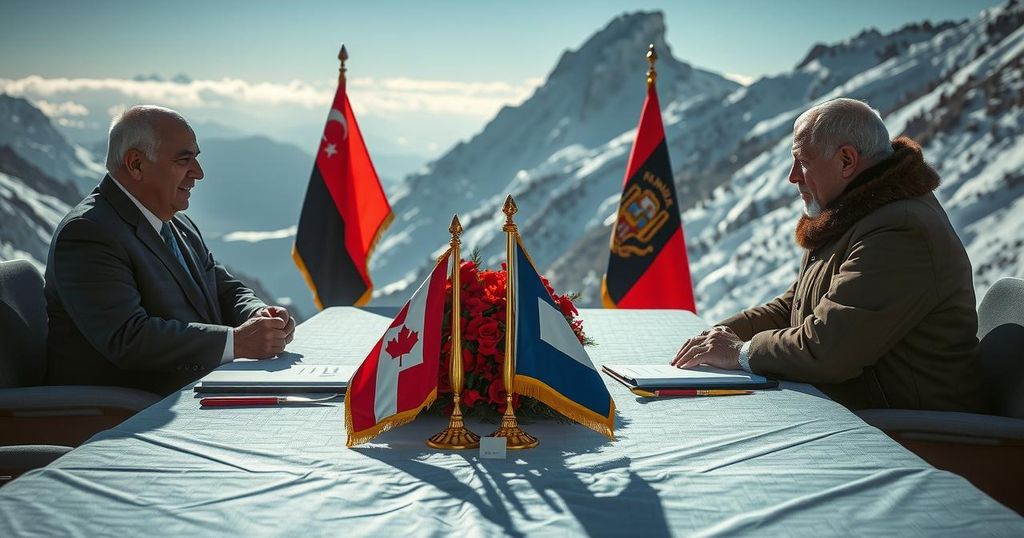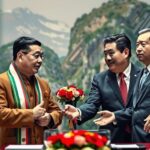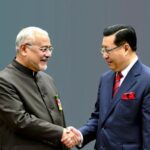Politics
AR, ARZU RANA DEUBA, ASIA, BEIJING, CHINA, COMMUNIST PARTY OF NEPAL - UNIFIED MARXIST LENINIST, CPN, CPN - UML, DIPLOMACY, FOREIGN POLICY, INDIA, INTERNATIONAL RELATIONS, KATHMANDU, KHADGA PRASAD OLI, MARXIST, NEPAL, NEW DELHI, OL, OLI, STRATEGIC PARTNERSHIP, TIBET, UNIFIED, XI
Omar El-Sharif
Navigating Diplomatic Balance: PM Oli’s Strategic Visit to China
Nepal’s Prime Minister Khadga Prasad Oli’s December visit to China yielded a significant Framework for Belt and Road Initiative Cooperation, facilitating case-by-case negotiations. The trip emphasized Nepal’s strategic diplomacy in balancing its relationships with both China and India amid internal political complexities, positioning Nepal advantageously in geopolitical terms while addressing its infrastructure needs. The establishment of a joint task force involving key political parties further highlights a collaborative approach to navigating foreign investments and policy making, critical for the country’s future endeavors in international relations.
During his recent diplomatic venture from December 2-5, Nepal’s Prime Minister Khadga Prasad Oli managed to traverse the complex landscape of international relationships, successfully negotiating key agreements despite the pressing geopolitical tensions between China and India. His visit culminated in the signing of the Framework for Belt and Road Initiative Cooperation, which, while modest, lays the groundwork for further bilateral negotiations on specific projects rather than imposing a blanket approach. This strategic maneuvering exemplifies how Nepal can deftly balance its relationships with major powers while catering to its domestic political climate.
Amidst the pressures of fostering domestic economic growth and navigating external geopolitical concerns, Prime Minister Oli’s approach reflects a nuanced understanding of Nepal’s position as a small state. The resulting joint statement from the talks with Chinese officials underscores a commitment to cooperation, emphasizing the significant importance of bilateral relations while recognizing the necessity for further progress. With commitments made to develop major infrastructure projects and strengthen connectivity, the visit may indeed serve as a model for how small countries can effectively engage with larger regional powers.
Crucially, the joint task force established to draft the BRI Framework Agreement included representatives from both the Communist Party of Nepal-Unified Marxist Leninist (CPN-UML) and the Nepali Congress, illustrating a collaborative effort that could stabilize Nepal’s political landscape. By deliberately avoiding overly binding agreements and permitting flexibility in project negotiations, Prime Minister Oli has ensured that Nepal retains agency over its engagement with China.
The joint initiative also reflects Nepal’s careful diplomatic stance, as it reaffirms its support for China’s national policies while sidestepping sensitive terminologies that could alienate India. In doing so, Nepal declares its commitment to not harboring any anti-China sentiment on its territory while simultaneously fostering economic opportunities that derive from China’s investment trajectory. The arrangement paves the way for development in several local projects that had previously stalled, illustrating the potential for improved economic interdependence with China.
Oli’s administration must navigate feedback from domestic constituencies wary of increasing Chinese influence while counterbalancing this with the need for foreign investment and infrastructure development. Future visits to India will likely further define this geopolitical endeavor as Nepal seeks to balance external partnerships while nurturing its internal political unity. Overall, Prime Minister Oli’s visit to China could be key in defining a sustainable foreign policy framework for Nepal moving forward.
Nepal is situated between two major global powers—India and China—and has historically grappled with maintaining a balance between these nations. Recent geopolitical landscape changes, especially involving China’s Belt and Road Initiative (BRI), have intensified this balancing act. Under Prime Minister Khadga Prasad Oli’s leadership, Nepal aims to engage with both China and India while addressing domestic political pressures and economic needs. The successful completion of a framework for BRI cooperation marks a critical diplomatic achievement for Nepal, establishing a precedent for future negotiations and geopolitical engagement. The established joint task force represents an important milestone in connecting Nepali political parties to larger infrastructural strategies, creating a cohesive stance in international negotiations.
In conclusion, Prime Minister Oli’s diplomatic visit to China represents a significant effort to balance Nepal’s foreign relations amidst heightened geopolitical tensions. By facilitating a template for project-based cooperation rather than sweeping agreements, this visit may strengthen Nepal’s economic ties with China while allowing for extensive negotiation flexibility. Coupled with anticipatory discussions with India, this visit may guide Nepal’s future foreign relations strategy, illustrating the intricate dance of diplomacy required for small states in an increasingly polarized global environment.
Original Source: www.hindustantimes.com








Post Comment